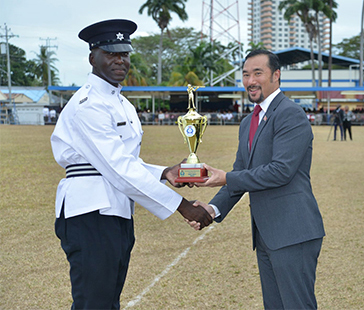(Trinidad Guardian) National Security Minister Stuart Young is challenging activist Yesenia Gonzales and other Venezuelan nationals to bring evidence they have against Immigration officers they allege are taking bribes from Venezuelan nationals seeking to gain entry into T&T and to stay here after their time has elapsed.
Young made the call yesterday, hours after Gonzales made the claim on CNC3’s The Morning Brew and some of her compatriots backed up the allegation.
“A particular person of Venezuelan heritage…let’s call her that…was making a whole host of allegations…I am calling on Ms Gonzales, if she has evidence of any of those activities, to come forward to the TTPS and give the information to them,” Young said after attending a passing out parade for police officers at the St James Training Academy.
He added that the police would bear the responsibility of investigating if there are any allegations of criminal activity.
Young also clarified one of the things he said in the Senate on Tuesday, saying while he knows allegations of intimidation of Immigration officers are being made against Venezuelan nationals, there were also T&T nationals who were doing so as well.
“We are working with the TTPS to hold these persons,” Young said.
The issue arose after Immigration officers claimed they were intimidated by relatives of a group of Venezuelan nationals who were refused entry into the country after arriving on a flight from Venezuela last week. Young addressed the matter in the Senate on Tuesday and said police would now set up sting operations at the Piarco International Airport and other ports of entry to arrest any individuals who may engage in this activity.
Yesterday, however, Venezuelan nationals living in T&T, Gonzales among them, scoffed at the claims.
“That is (a) big joke. Everybody laughing at the statement that the Minister of National Security (made) and he has to be very careful about,” Gonzales said.
Gonzales said contrary to what Young was saying, she felt it was the other way around as many Venezuelans felt they were being victimised and exploited by the Immigration officers, with many who were already here forced to make payments to stay in the country.
“It is the Immigration (officer) who has a lot of the power. They are the ones who are deporting them and persecuting them and asking them for money from people who don’t even have money and they say they are illegal. A lot of complicated things, a lot of negative things going on with the Venezuelans here, who looking forward for a safe place or something like that and the immigration just taking advantage of that,” Gonzalez said.
Gonzalez said she believed it was more likely that persons who were involved in bringing Venezuelans and other nationals into the country illegally were the ones threatening Immigration officers.
“The persons who bring people here and doing all sorts of thing to Venezuelans, they are probably the ones doing that to Immigration, not the Venezuelans. The Venezuelans don’t have anybody here, they don’t speak the language,” said Gonzalez.
“The Immigration seem to have more power than the Prime Minister and the Minister of National Security.”
Venezuelan refugee and human rights lawyer Karla Henriquez also said there were numerous instances of Venezuelans and other refugees being asked to pay immigration officers security bonds for their continued stay in this country. Interestingly, the cost of the security bond would vary based on the nationality of the asylum seeker, she said.
“When your time is up, you get a bond to apply to stay and then the Immigration tell you you’re gonna get back the money when you leave,” said Henriquez via a translator.
“Colombians, Cubans and other nationalities pay a different amount.”
She said the price was also increased based on if the asylum seekers came in using legal papers or not.
“If you have legal papers and you ask for the bond it’s $2,100, but if you came via an illegal act it’s more money that you have to pay,” Henriquez said.
Guardian Media received photographs of the bonds, stamped by Immigration officials, indicating the various forms of payment. However, Henriquez said these payments should not be legal based on treaties Trinidad and Tobago had signed with the United Nations.
In January, several refugees protesting outside the Parliament also claimed Immigration officers were asking them for money in order for them to see their families at the Immigration Detention Centre. When Guardian Media asked about that practice then, Ministry of National Security officials denied there was any such practice.

